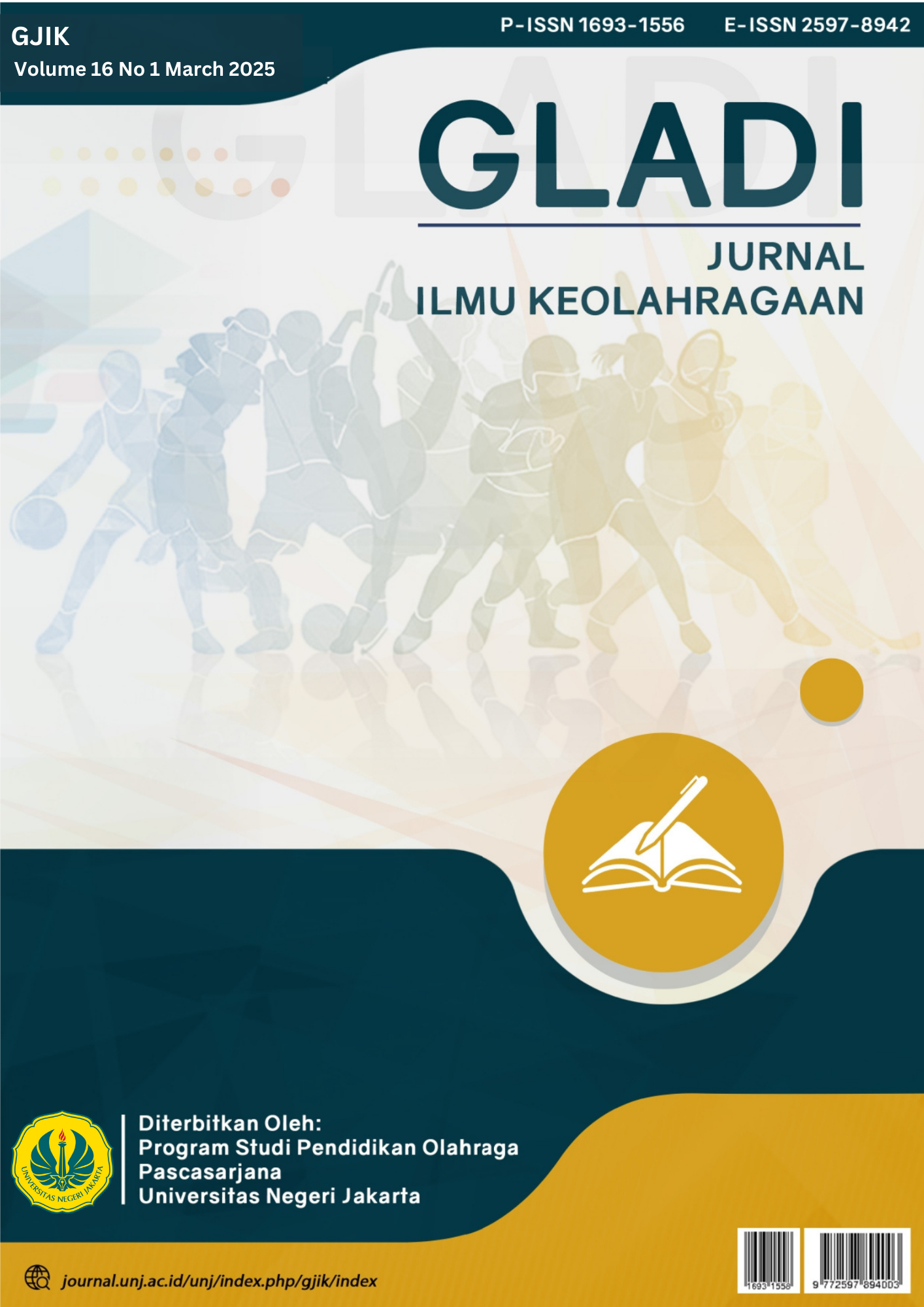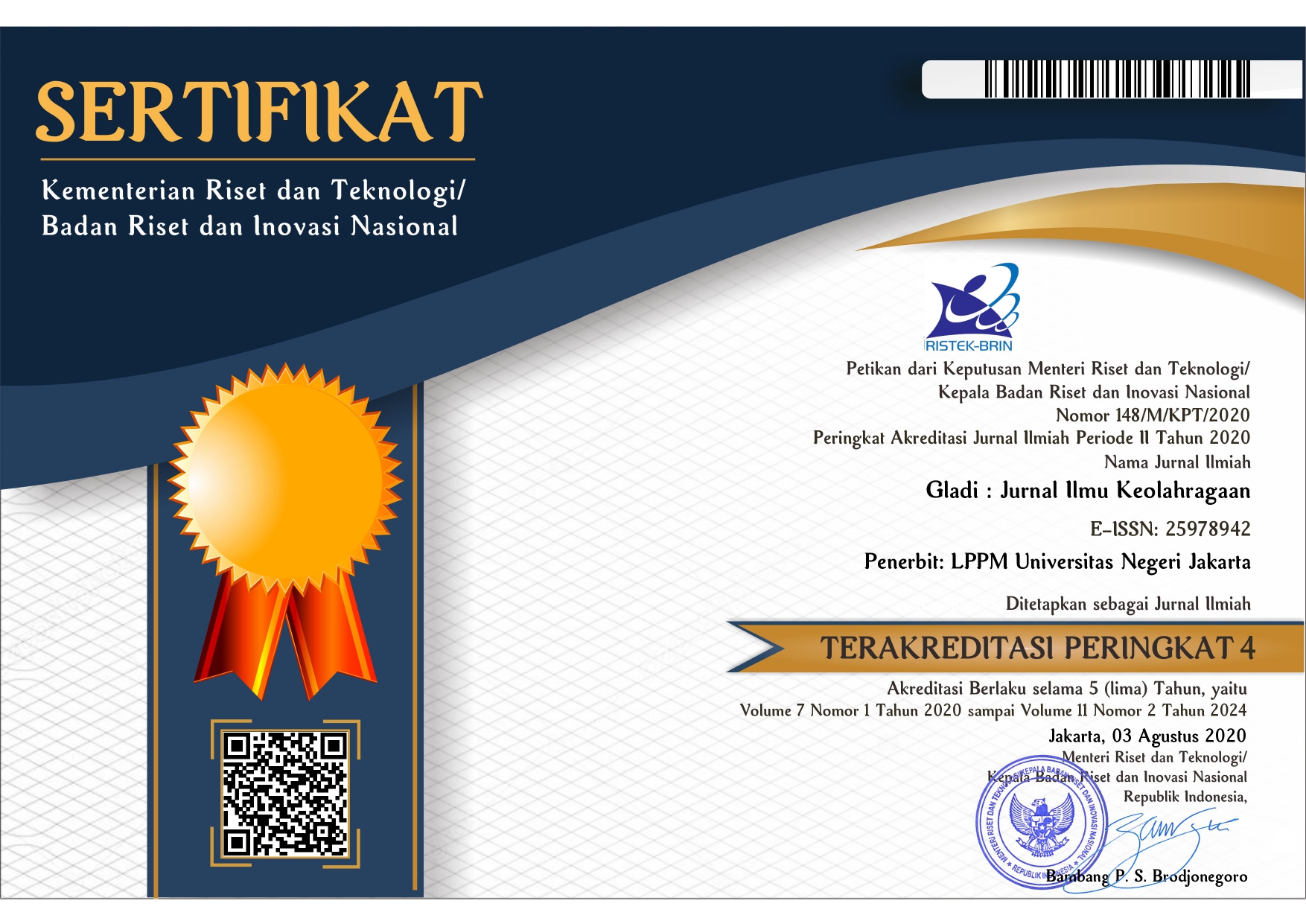EVALUATION OF INDONESIAN MUAYTHAI MARTIAL DEFENSE SPORT ACHIEVEMENT DEVELOPMENT IN 2023
DOI:
https://doi.org/10.21009/GJIK.161.01Keywords:
Keywords: evaluation, achievement coaching, CIPP, muaythaiAbstract
The aim of this research is to evaluate the development of sports performance in Muaythai martial arts in Indonesia using the context, input, process, and product (CIPP) model. Researchers focus their research on the context, input, process, and product of sports performance development that supports the development of sports performance among muaythai martial arts athletes in Indonesia in an effort to achieve continuously increasing achievements.This research is qualitative research with descriptive analysis.The data collection techniques used were interviews, observation, and documentation. The data source in the research is the subject from which the data was obtained or taken, namely the Indonesian Muaythai Executive Board. In presenting the CIPP evaluation data, information from the four dimensions is presented comprehensively. The presentation of CIPP evaluation data helps policymakers and practitioners make better decisions for program improvement. The results of the research show that in the context of developing achievements in the muaythai martial arts sport, a vision and mission are composed, which are realized in the work program. The planned work program has been discussed in work meetings and evaluated at the end of each year. In the input component, including resources for coaches, athletes, and funding, there are several indicators that serve as recommendations. The achievement development process component includes the recruitment of coaches and athletes as well as the implementation of programs that have been run according to procedures, starting with planning, implementation, and evaluation. In the product component of sports performance development in martial arts, there are two indicators, namely achievement and improving the quality of human resources, which, in terms of performance indicators, have not yet reached optimal performance at the international level. The conclusions of this research are in the form of recommendations that researchers can convey: (1) PBMI needs to collaborate with sponsors in order to foster sporting achievements in muaythai martial arts in Indonesia; (2) it is necessary to increase the distribution and acceleration of trainer certification from branches and regions to the center throughout Indonesia to support the professionalism of trainers; and (3) there needs to be a record of the progress of the physical and technical qualities of each individual athlete, which can be input into the athlete database, so that it can be utilized by users who are interested and involved in developing muaythai achievements.
Downloads
References
Akhmad, N., & Muhaimin, A. (2018). Latihan Olahraga Pelajar Kota Mataram. Jurnal Ilmiah IKIP Mataram, 4(2), 55–62.
Raihan. (2017). Metodologi Penelitian. In Universitas Islam Jakarta. Universitas Islam Jakarta.
Vanagosi, K. D., & Dewi, P. C. P. (2019). Evaluasi Program Pembinaan Prestasi Cabang Olahraga Panahan Di Bali. Jurnal Penjakora, 6(1), 24. https://doi.org/10.23887/penjakora.v6i1.17353
Wicaksono, S. W. A., & Supriyono. (2021). Survei Pembinaan Prestasi Atlet Dayung Pada PODSI Kabupaten Pati Tahun 2020. Jurnal Media Ilmu Keolahragaan Indonesia, 3(1), 94–99.
Wijaya, R. G. (2022). Kelas Olahraga Sebagai Upaya Pembinaan Prestasi yang Berkelanjutan. JORPRES (Jurnal Olahraga Prestasi), 18(3), 40–45.
Adzilika, A. (2018). Evaluasi Program Pembinaan Prestasi Atlet Cabang Olahraga Terukur di Provinsi Lampung. In Jurnal Of Physical Education And Sport (Vol. 8, Issue 1).
Akhmad, N., & Muhaimin, A. (2018). Latihan Olahraga Pelajar Kota Mataram. Jurnal Ilmiah IKIP Mataram, 4(2), 55–62.
Downloads
Published
How to Cite
Issue
Section
License
Copyright (c) 2025 Miranti Nur Anggrahini, Ramdan Pelana, Oman U. Subandi

This work is licensed under a Creative Commons Attribution-ShareAlike 4.0 International License.







